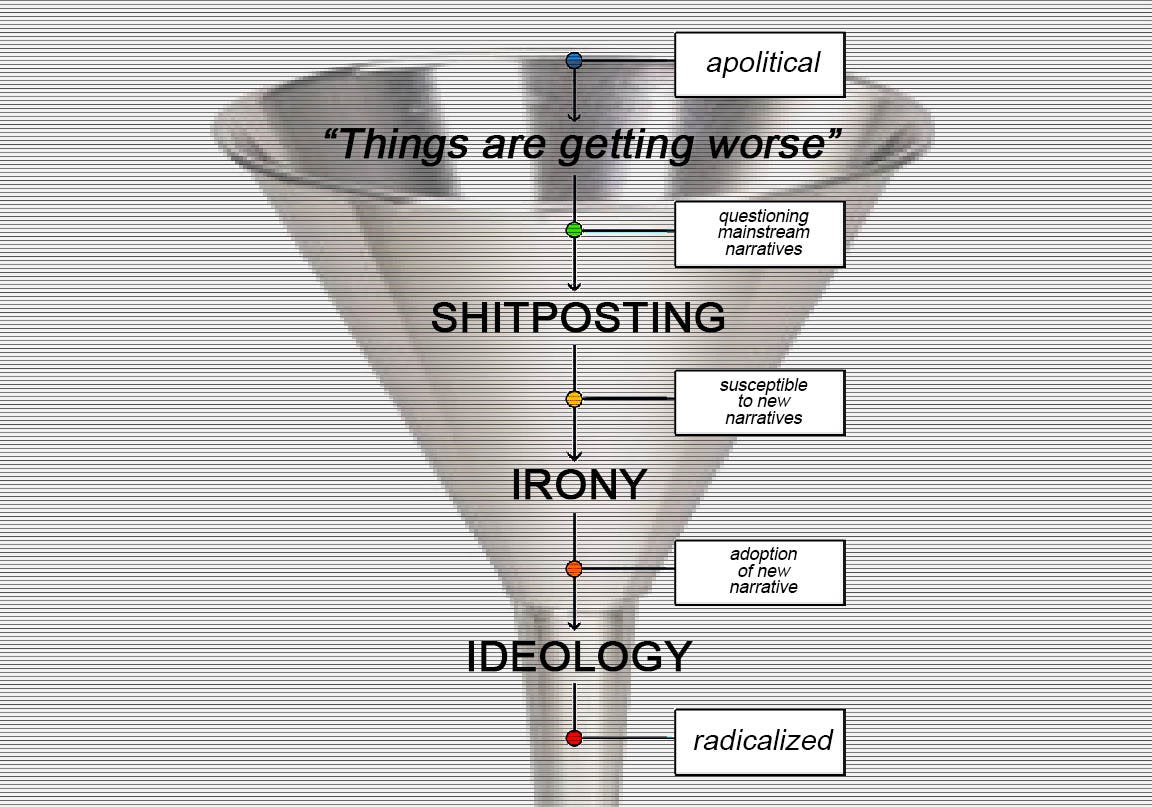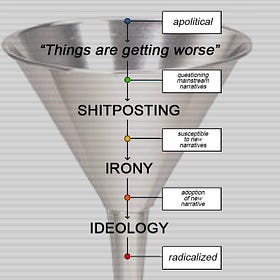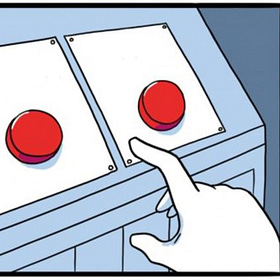My guest is Caleb Cain or Faraday Speaks as he is known online. Episode #10 is out now. This is an important conversation. I hope you will give it the time and consideration it deserves.
This show covers a wide array of topics, everything from social media to philosophy and real world politics. My hope is that these conversations will help us better understand the complex links between the online and offline worlds. You can support this program by becoming a paid subscriber:
In 2019, Caleb Cain posted a video on YouTube called “My Descent into the Alt-Right Pipeline”. In the video, he described his first person experience of online radicalization. It quickly went viral.
Soon after, Cain was profiled in The New York Times in a piece titled “The Making of a YouTube Radical” which is widely regarded as the case study for much of these online phenomena. In 2020, he was featured again by the New York Times in the first three episodes of the popular Rabbit Hole podcast.
Later that year, Cain joined PERIL, the Polarization & Extremism Research & Innovation Lab, at American University. At PERIL, he worked as an associate researcher in the field of CVE, countering violent extremism. Cain hoped to put his knowledge and insights to use in creating better outcomes across social media. He left that position in 2021. Today, he joins us to tell his side of the story.
Since 2018, I have publicly made the case that declining economic prospects are sending young people onto the internet in search of answers. As things get worse, viewers understandably seek out alternative narratives to help explain the world around them. Their experiences on social media then send them back out into the real world with a new political vision. This process is happening at a vast scale and it can lead to better or worse (mostly worse) outcomes. Understanding the root causes behind these phenomena will be key if we hope to produce more desirable results.
Caleb agrees with some of my theoretical framework but he firmly disagrees with other parts of it. We explore some of these topics in today’s episode.
If you’re new to this program — I’ve spent the past few years writing about extremely online young people with radical politics. This research has taken the shape of written and audio interviews, as well as articles and essays theorizing this process and proposing alternative strategies.
Within that time, there has been a great deal of scholarship and journalism on the topics of rabbit holes, funnels and pipelines. These abstract models help to explain how young people get exposed to extreme political ideas online. But despite this important research, its clear that radical politics continues to grow at an increasingly rapid pace.
As we explore in today’s episode, the popular narrative around “political pipelines” is deeply flawed. While media coverage has focused on the unintended consequences of algorithmic recommendation, it has chosen to ignore the socioeconomic drivers that cause people to seek out political content in the first place. Economic precarity and social atomization are on the rise alongside content consumption. So long as these core material issues remain unaddressed, the online radicalization problem will continue to get worse.
In the mainstream media, the popular narrative that “viewers are merely swept along by their algorithmic newsfeeds” has been used to obfuscate the real political problems in the United States. Its easier for journalists to blame “the algorithm” than to name the underlying material crises. After numerous redesigns, tuning and tweaks to major platforms, radical politics, on both the left and right, still continues to grow.
According to many of today’s elites, the issue at hand is an oversight in the design of social media. Its something that can simply be fixed with a new patch of code. But there is no technical solution to a political problem.
You can read some of my earlier writing on these topics below. This text was first published on NEW MODELS in 2019:
Irony Politics & Gen Z (part 1)
If these online communities are unfamiliar, this may be a useful primer: Politigram & the Post-left. This text was originally published on NEW MODELS Near the end of 2018, I wrote an article about TikTok and Gen Z. My piece focused on generational differences in social media use. I argued that, broadly speaking, Millennials are individualist, entrepreneurial, and …
Irony Politics & Gen Z (part 2)
Read part 1: Irony Politics & Gen Z (part 1). If these online communities are unfamiliar, this may be a useful primer: Politigram & the Post-left. This text was originally published on NEW MODELS. Near Future Struggle That the edgy teens of TikTok are now enlisted in the culture war is self-evident. But what is often less clear—or opportunistically overlooked by …
Caleb Cain’s story inspired the world to think differently about online politics. He set the narrative for our pop cultural understanding of these topics. I’m grateful for his generosity in sharing this conversation with us.
Doomscroll #10: Faraday Speaks: Beyond Pipelines and Rabbit Holes





talking about the contempt and disgust he witnessed from the liberal, left-wing people towards trump supporters, libertarians, people who want a strong border
believing them to be robots incapable of agency, brainwashed, the manipulatable ingredients of fascism in waiting
saying if you just changed your ways, if you'd just speak to them and believe in their ability to think logically
-----
I have seen this too, and been frustrated with it. I think it has to do with their sense of identity being wrapped up in resistance. focusing on being anti-fascist instead of looking at the actual problems people are experiencing that are leading to the beliefs and belief-state that makes them interested in right wing ideology. this need for the identity of resister generates the behaviors and disgust and models of understanding of conservatism or libertarianism that they hold.
it is similar to police
cops often approach situations with a sense of identity - "I am a protector, an administrator of the law, of good against evil." this identity requires an evil to exist, and so it is assumed. this vision of evil is applied to the people they police, who are often not evil but whose disruption to society has deeper systemic roots
Interesting episode. I agree that it's hard to strike a balance between what we might deem "legitimate" CVE and the expansion of the national security state/mass surveillance. The 'self-licking ice-cream cone' incentive structure of the CVE industry is a very tricky and pernicious problem.
I wrote about the risks of "over-securitization" here: https://www.decentralizedfiction.com/p/self-licking-ice-cream-cones-and